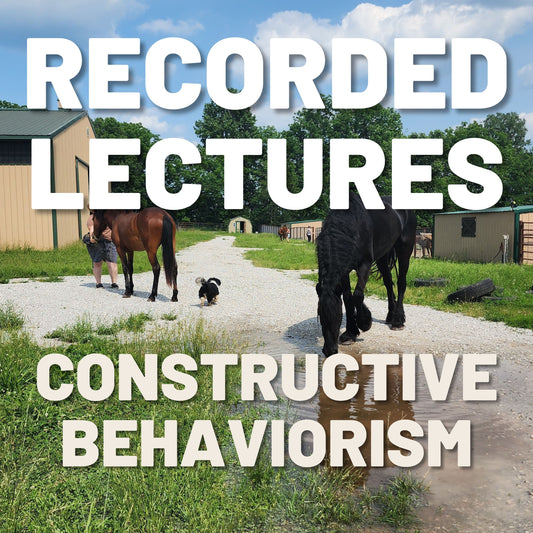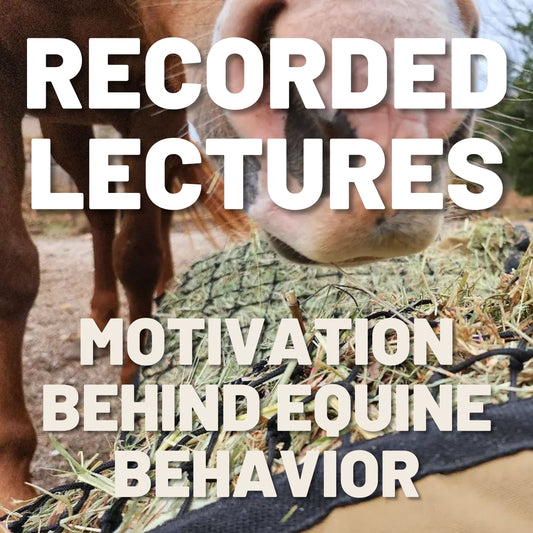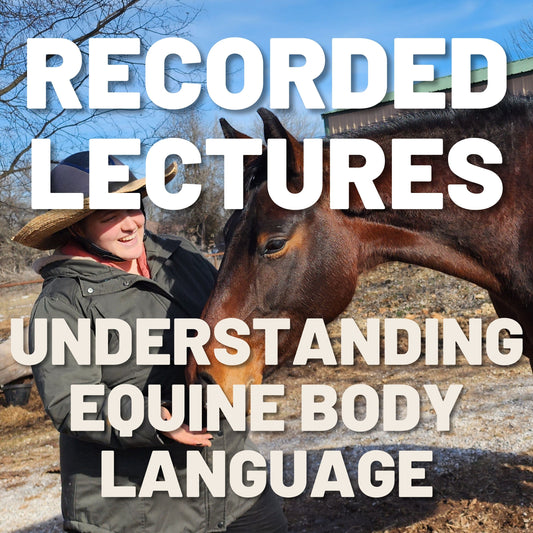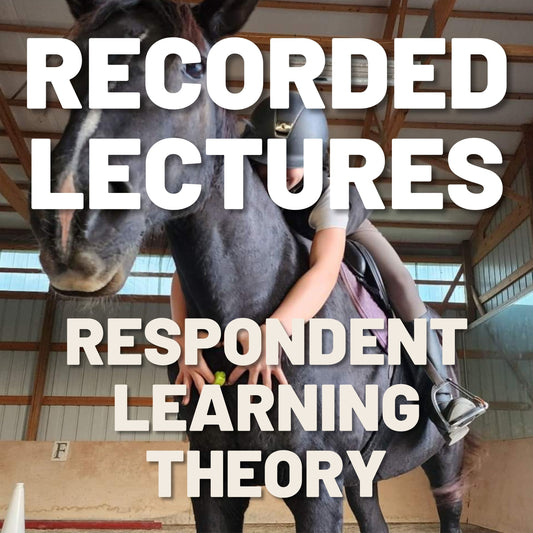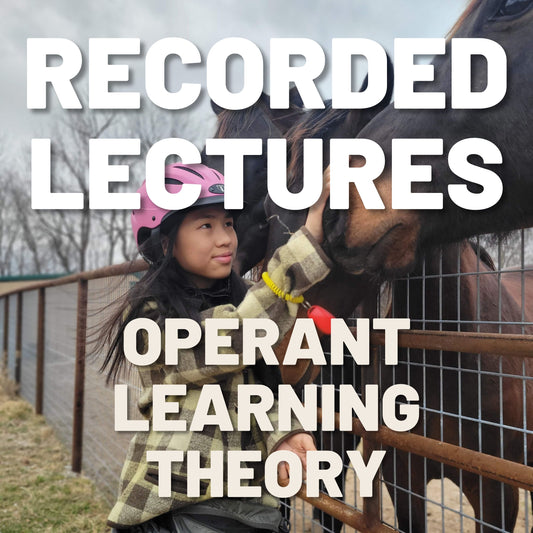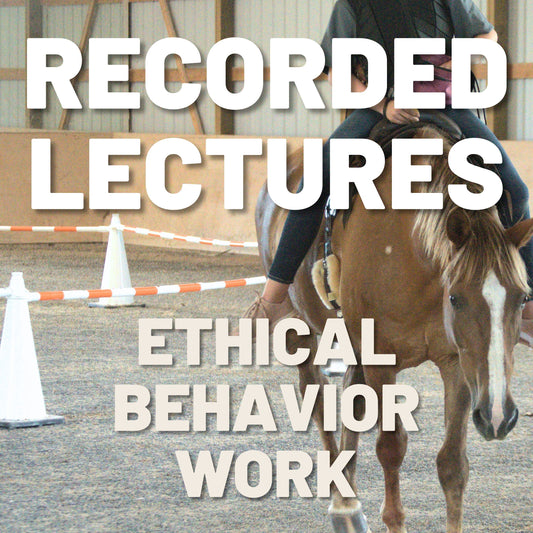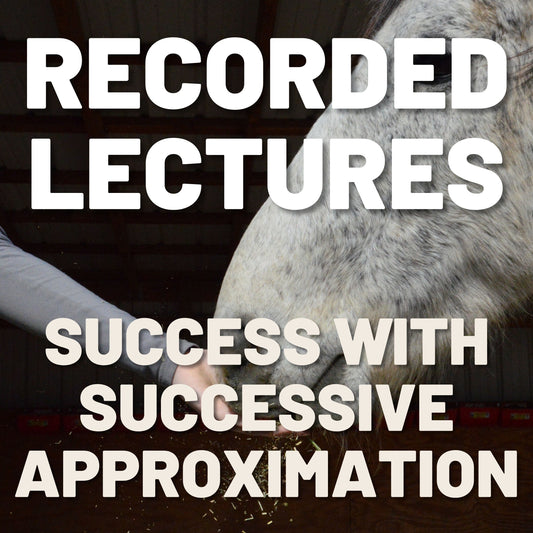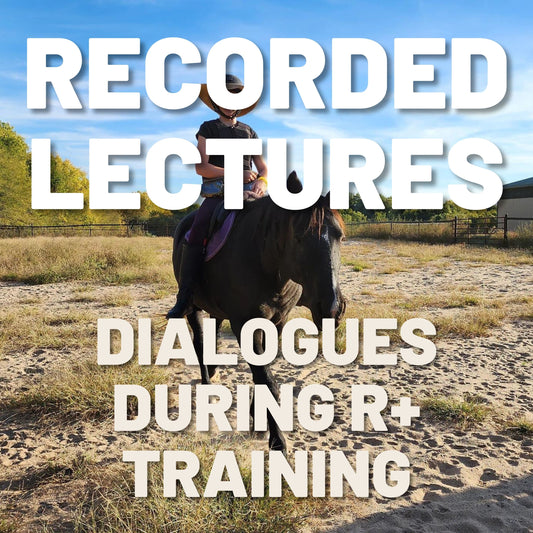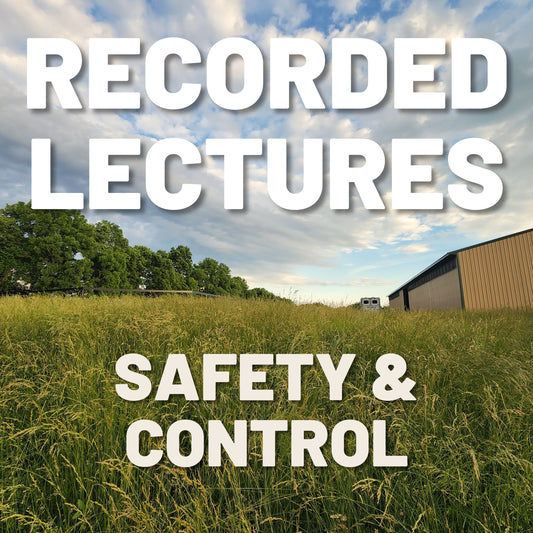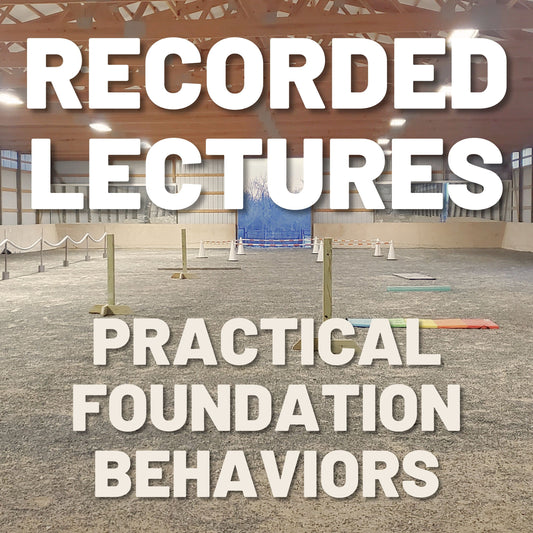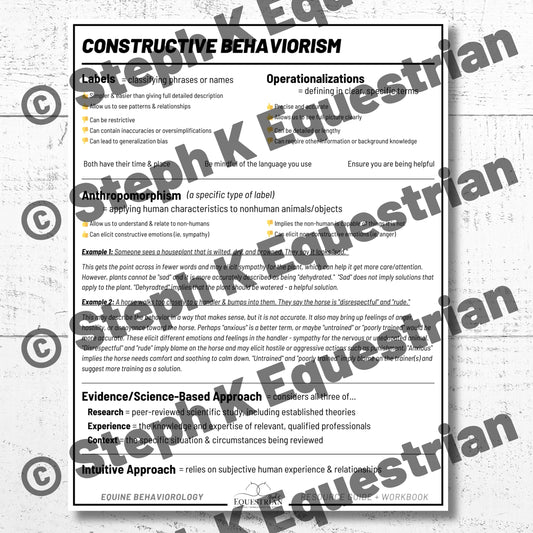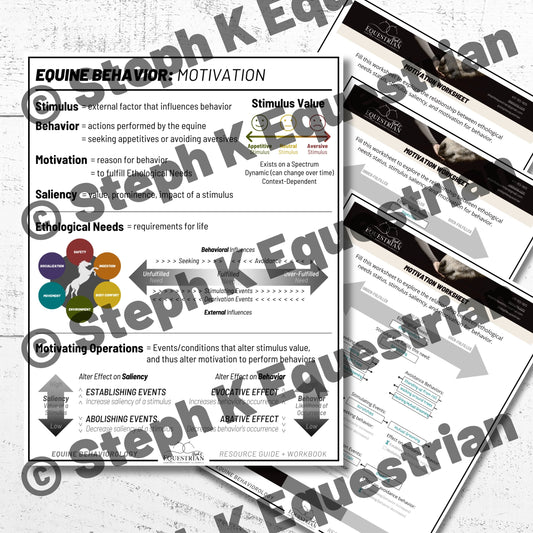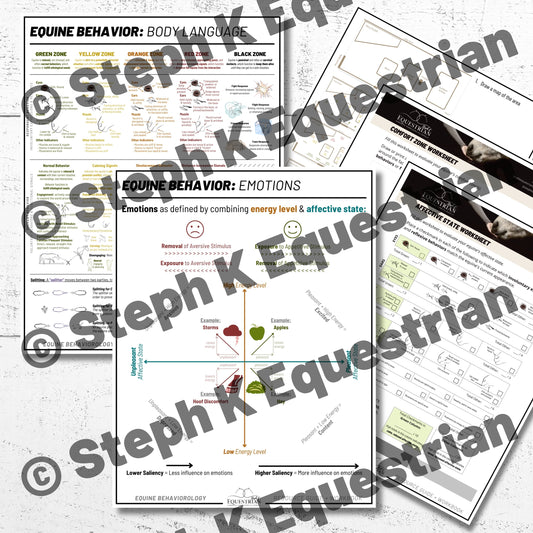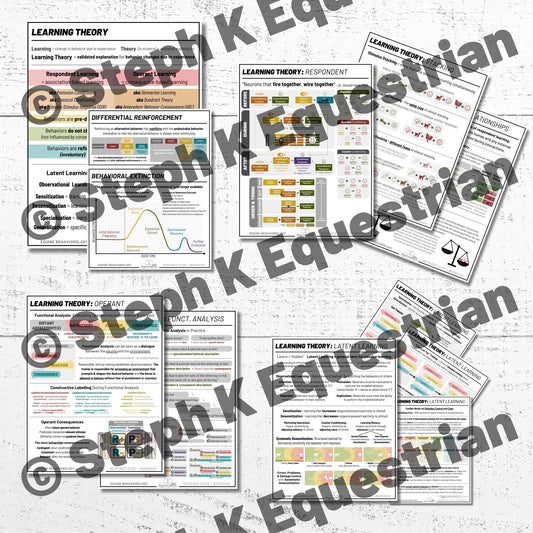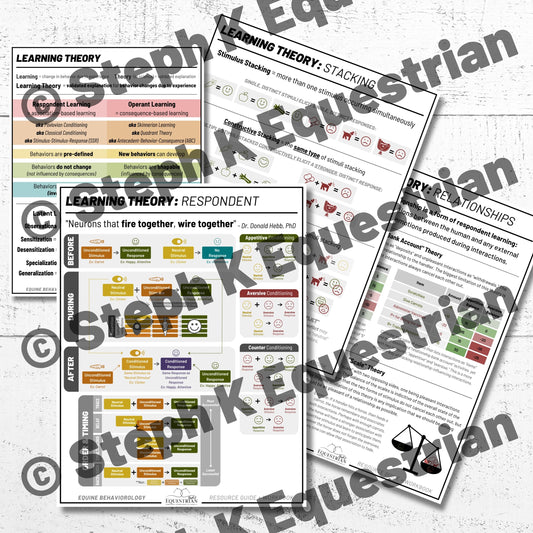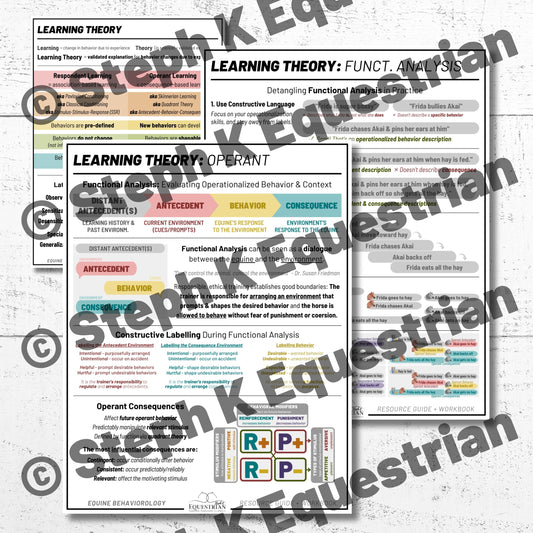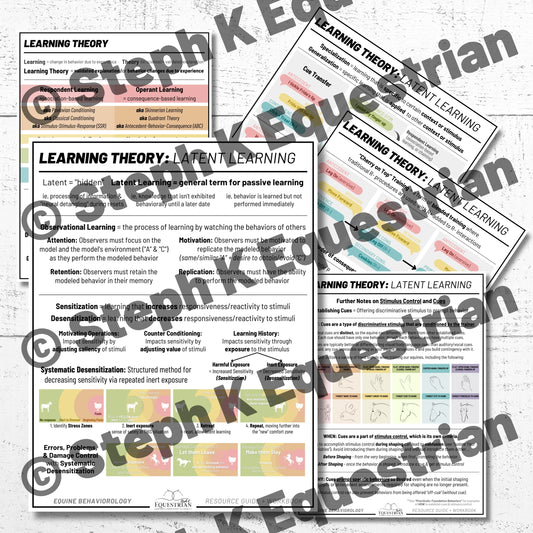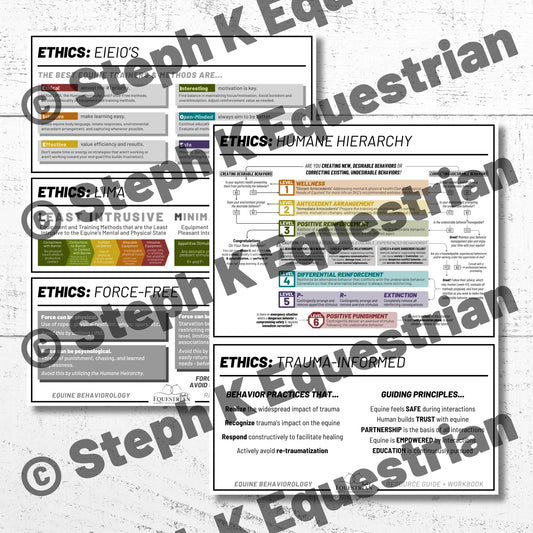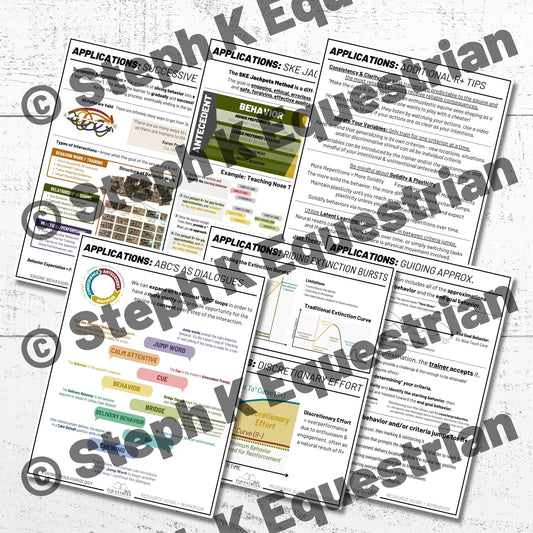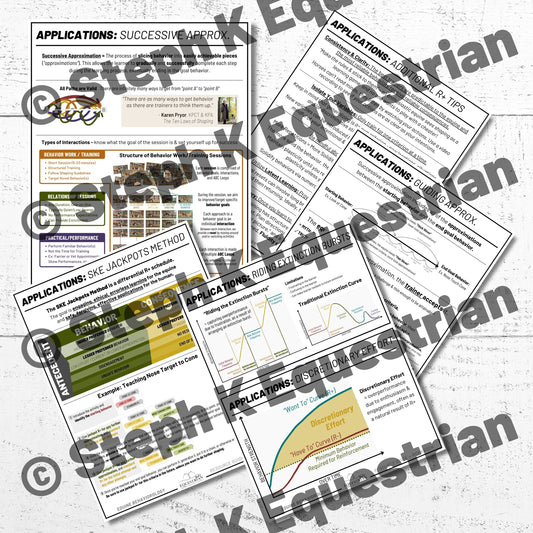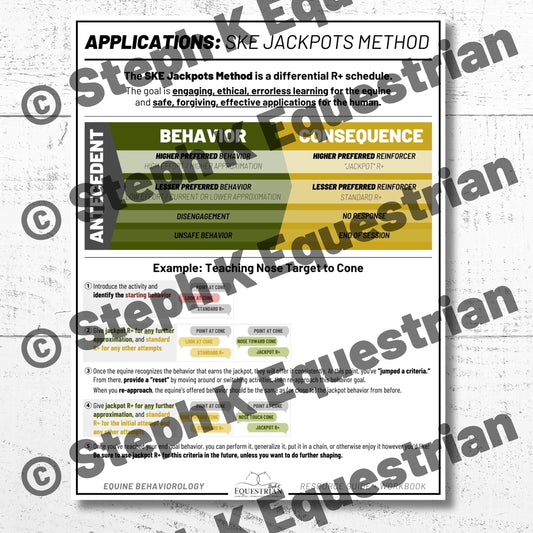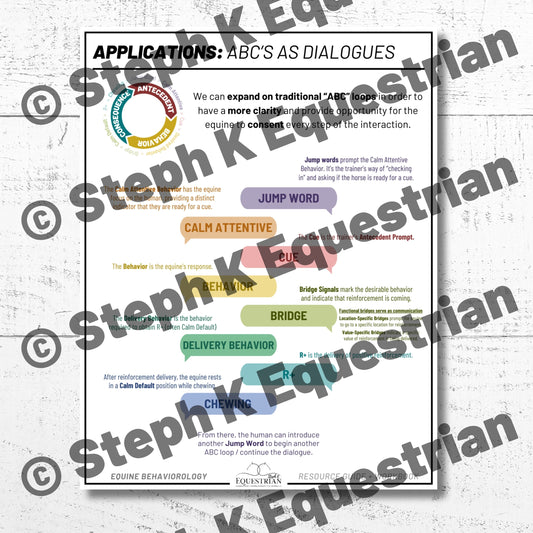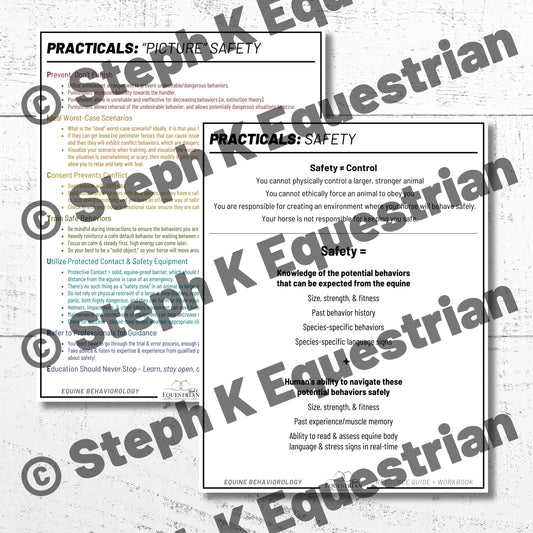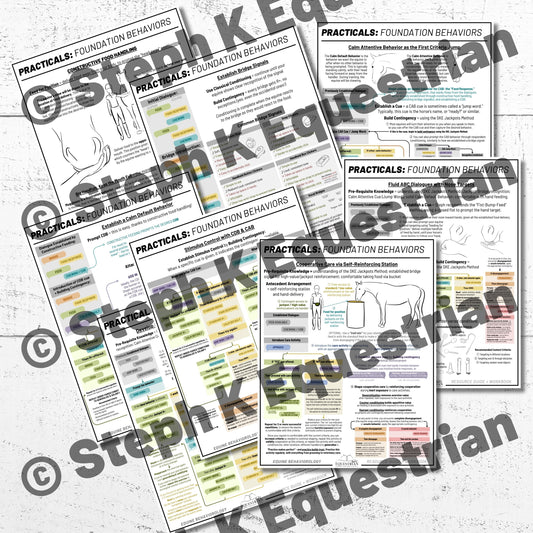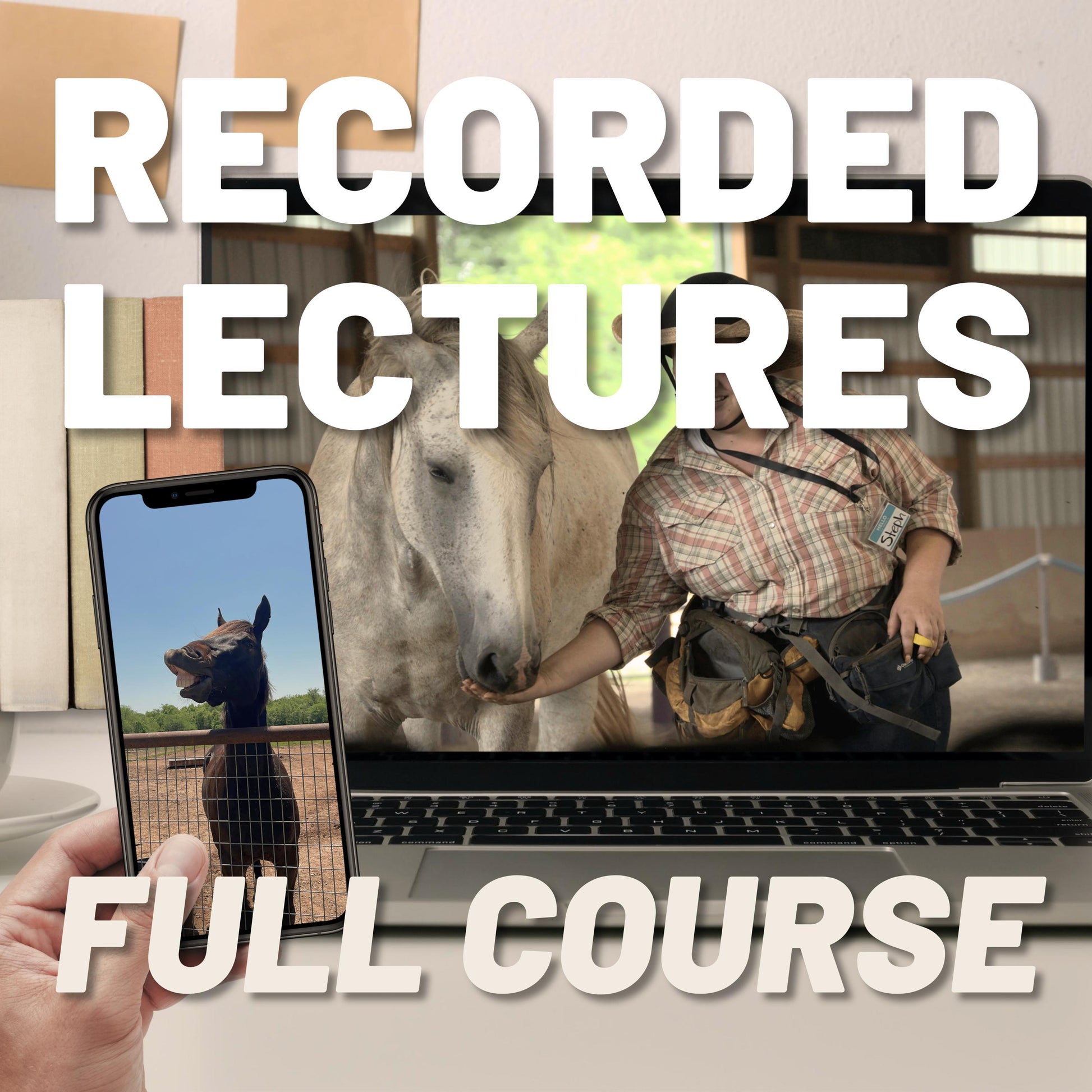
SKE Clicker Shoppe
Equine Behaviorology Online Course, Recorded Lectures (10 Lessons)
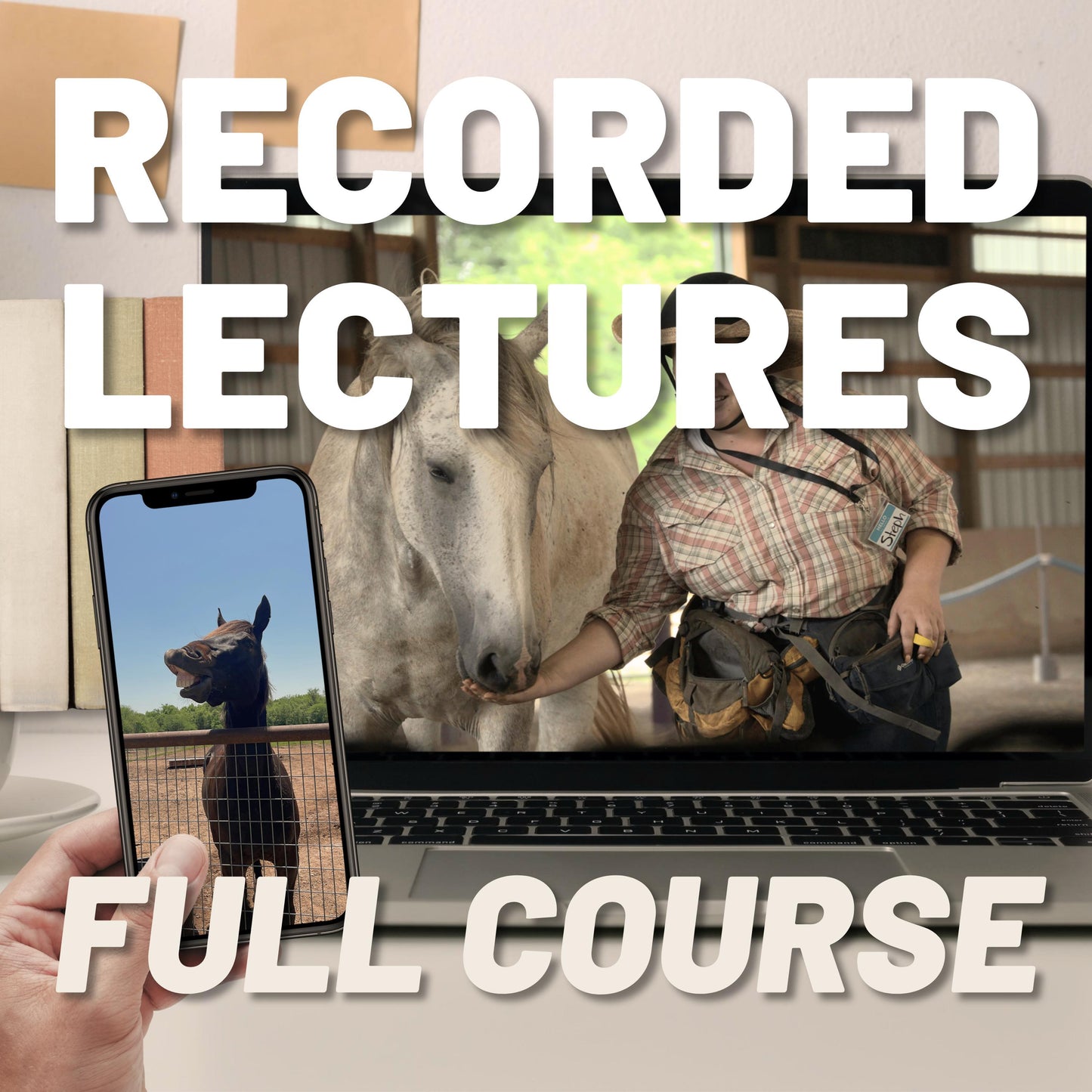
Everything you need to know to train your horse effectively and ethically!
-
This course is available to anyone in the world who:
🐴 Wants to understand horse behavior
🐴 Wants to be a more effective trainer, handler, or rider
🐴 Wants to connect with their horse on a deeper level
🐴 Wants to train EFFECTIVELY and ETHICALLY ❤️
Steph's intuitive visual aids and her fun, conversational lecture style make even the most complex topics easy to understand. Her students range from casual enthusiasts to industry-leading professionals, and she aims to empower each of them by demystifying the "art" & "science" of equine training. -
This course gives a comprehensive overview of EQUINE BEHAVIOROLOGY - the study of equine behavior. This course includes 10 lessons (over 15 hours total!) that follow along the "central dogma" of equine behaviorology: Ethology 👉 Learning Theory 👉 Ethical Considerations 👉 Experience
🐎 Equine Ethology allows us to understand motivation & predict typical behavior
🧠 Learning Theory allows us to understand how past experiences influence future behavior
❤️ Ethical Considerations allow us to evaluate & identify the best behavior solutions
🥕 Experience allows us to develop fluidity in the application of our knowledge -
💻 Access lecture recordings from anywhere in the world, anytime via our SKE Online Video Resources website. Once you've purchased this course, use your email to login & view your video(s).
Want one-on-one instruction from Steph?
Book a Virtual Consult to get direct feedback on your specific situation with your equine from anywhere in the world, request a Clinic Booking to have Steph travel to you, or sign up for our Local Education opportunities at our 100% Force-Free, R+ facility in Missouri, USA.
Individual Lectures
-
Equine Behaviorology Lesson 1: Constructive Behaviorism, Recorded Lecture
Regular price $14.99 USDRegular priceUnit price per$19.99 USDSale price $14.99 USDSale -
Equine Behaviorology Lesson 2: Motivation Behind Equine Behavior, Recorded Lecture
Regular price $14.99 USDRegular priceUnit price per$19.99 USDSale price $14.99 USDSale -
Equine Behaviorology Lesson 3: Understanding Equine Body Language, Recorded Lecture
Regular price $14.99 USDRegular priceUnit price per$19.99 USDSale price $14.99 USDSale -
Equine Behaviorology Lesson 4: Respondent Learning Theory, Recorded Lecture
Regular price $14.99 USDRegular priceUnit price per$19.99 USDSale price $14.99 USDSale -
Equine Behaviorology Lesson 5: Operant Learning Theory, Recorded Lecture
Regular price $14.99 USDRegular priceUnit price per$19.99 USDSale price $14.99 USDSale -
Equine Behaviorology Lesson 6: Ethical Behavior Work, Recorded Lecture
Regular price $14.99 USDRegular priceUnit price per$19.99 USDSale price $14.99 USDSale -
Equine Behaviorology Lesson 7: Success with Successive Approximation, Recorded Lecture
Regular price $24.99 USDRegular priceUnit price per$29.99 USDSale price $24.99 USDSale -
Equine Behaviorology Lesson 8: Dialogues During R+ Training, Recorded Lecture
Regular price $14.99 USDRegular priceUnit price per$19.99 USDSale price $14.99 USDSale -
Equine Behaviorology Lesson 9: Safety & Control, Recorded Lecture
Regular price $14.99 USDRegular priceUnit price per$19.99 USDSale price $14.99 USDSale -
Equine Behaviorology Lesson 10: Practical Foundations, Recorded Lecture
Regular price $49.99 USDRegular priceUnit price per$59.99 USDSale price $49.99 USDSale
Course Content
-
Lesson 1: Constructive Behaviorism
This class is the perfect introduction to the Equine Behaviorology course, as it features an overview of the theory, discussions, & content covered throughout the course. It also provides a solid foundation for approaching behavior work, training, & equine management using a constructive lens.
This class covers essential topics like...
✍️ Labels & Constructs
✍️ Anthropomorphism
✍️ Operationalization
✍️ What makes an "evidence-based approach"?
✍️ The value of science, and the value of intuition
Purchase this class individually -
Lesson 2: Motivation Behind Equine Behavior
In this class, you'll learn about dynamic motivation and the huge role it plays in your interactions, training, & relationship with your equine. This class covers some of the most important, yet often overlooked, concepts in training theory.
Topics include:
✍️ Defining an objective stimulus
✍️ The spectrum of value, from aversive to appetitive
✍️ Stimulus value as a subjective, dynamic, and context-dependent variable
✍️ Saliency, and its influence on motivation & behavior
✍️ The role of species-specific needs on equine behavior
Purchase this class individually -
Lesson 3: Understanding Equine Body Language
In this class, we demystify equine body language, so you don't have to be a "horse whisperer" to understand what your horse is trying to communicate to you!
This class gives an evidence-based overview of the following topics:
✍️ Equine affective states & emotions
✍️ Equine stress & comfort zones
✍️ Involuntary reflexive behaviors - such as facial expressions & survival reflexes
✍️ Functional communication signals - such as calming signals, displacement behavior, & distance increasing signals
Purchase this class individually -
Lesson 4: Respondent Learning Theory
Respondent learning, or association-based learning, is one of the two biggest learning theories that influence your equine's behavior. For everything from spooking to relationship building, and clicker conditioning to confidence over fences, understanding respondent learning is essential for effective, ethical equine training.
This class covers key topics like...
✍️ Neural roots of behavior & learning
✍️ Classical conditioning
✍️ Stimulus stacking
✍️ Counter-conditioning
✍️ Understanding relationship theory - including the "bank account," "balanced/scale," and "topographic" models
🎁 This class also includes FREE Bonus Content on Latent Learning topics including Sensitization and Desensitization!
Purchase this class individually -
Lesson 5: Operant Learning Theory
Operant learning, or consequence-based learning, is one of the two biggest learning theories that influence your equine's behavior. For everything from training basic ground manners to olympic-level performances, whether you use clicker training, natural horsemanship, or the old cowboy methods - operant learning is the basis of all effective training.
This class covers essential topics like...
✍️ Functional Analysis
✍️ Quadrant Theory
✍️ Detangling Complex, Real-Life Behavior Situations
✍️ Steph's tips for having constructive discussions on equine behavior from an operant lens
🎁 This class also includes FREE Bonus Content on Latent Learning topics including Observational Learning, Specialization, and Generalization!
Purchase this class individually -
Lesson 6: Ethical Behavior Work
Just because you CAN doesn't mean you should - and just because it works, doesn't mean it's ethical. It's our responsibility as equestrians to always strive to improve our standards for ethical care & training. This class gives you the tools you need to evaluate methods, professionals, equipment, & more, so you can make an informed decision about what is best for you & your equine.
This class covers essential topics like...
✍️ The "LIMA" approach
✍️ The "EIEIO's" for evaluating horsemanship
✍️ Force-Free horsemanship
✍️ Fear-Free horsemanship
✍️ Understanding & applying the Humane Hierarchy
✍️ Applying a "Trauma-Informed" approach within the equine industry
Purchase this class individually -
Lesson 7: Success with Successive Approximation
Probably one of the most influential classes from SKE, where Steph shares her best advice & strategies for efficient, effective shaping with R+ training.
This class covers essential topics like...
✍️ Understanding Shaping & Using Constructive Language Regarding Shaping
✍️ Expectations During Different Types of Interactions & Structure of Training Sessions
✍️ Implementing the SKE Jackpots Method (a differential R+ schedule for errorless learning)
✍️ Steph's Tips for Efficient, Effective Shaping
✍️ Methods for Guiding & Accepting Approximations
Purchase this class individually -
Lesson 8: Dialogues During R+ Training
In this discussion, we expand on the concept of functional analysis so you can learn to use your knowledge of learning theory to foster communication, not just compliance.
This class covers essential topics like...
✍️ Expanding the traditional "ABC" loops
✍️ Understanding functional analysis as a dialogue
✍️ Consistency & contingency during dialogue
✍️ Using dialogues to foster force-free, consent-based communication
Purchase this class individually -
Lesson 9: Safety & Control
An in-depth discussion on concepts of safety, confidence, anxiety, and control. This discussion includes Steph's advice for maintaining human safety & equine safety in routine & emergency situations, while also maintaining an ethical, force-free approach.
This class covers essential topics like...
✍️ Safety with horses
✍️ How safety is related to "control"
✍️ Maintaining human safety with horses
✍️ Maintaining equine safety during training
✍️ How to balance ethics & safety
✍️ Restoring confidence in the fearful or anxious equestrian
Purchase this class individually -
Lesson 10: Practical Foundations
A comprehensive overview of Steph's favorite exercises & behaviors for developing & polishing your R+ training skills while also establishing and/or improving your equine's R+ foundation. This class goes in-depth with the practical applications of the course content from Lessons 1-9 of the SKE Equine Behaviorology Course. Steph strongly recommends students start with Lessons 1-9, to ensure you are familiar with the language & concepts referenced during this lecture.
This class discusses the following recommended behaviors & training exercises, selected to help equestrians develop and/or refine their R+ training skills:
Constructive Food Handling
✍️ Preventing & resolving "mugging" & mouthiness
✍️ Using food constructively
Bridge Signals
✍️ Conditioning bridge signals
✍️ Establishing functional bridge signals
✍️ Pros & cons of common bridge signals
Calm Default & Calm Attentive Behaviors
✍️ Defining Calm Default vs Calm Attentive Behaviors
✍️ Establishing a Calm Default Behavior (CDB)
✍️ Establishing a Calm Attentive Behavior (CAB)
✍️ Effective Stimulus Control with CDB/CAB's
Fluid Dialogues via Nose Targeting
✍️ Establishing a nose-targeting behavior
✍️ Recommended behavior generalizing criteria
✍️ Recommended equipment generalizing criteria
✍️ Recommended context generalizing criteria
Cooperative Care via Self-Reinforcing Station
✍️ Establishing consent during cooperative care
✍️ Fluid applications of consent cues & dialogue
✍️ Utilizing Self-Reinforcing Stations (SRS)
✍️ Applying the SKE Jackpots Method with an SRS
✍️ The role of learning theory during cooperative care
Developing Free-Shaping with Face Targets
✍️ Establishing face-targeting behaviors
✍️ Successive approximation in practice
✍️ The SKE Jackpots Method in practice
✍️ Defining prompts vs cues; establishing cues
✍️ Refining Stimulus Control
In addition to detailed lecture materials, this class also includes video recordings of Steph training equines, to provide examples of these techniques & methods in action.
Purchase this class individually
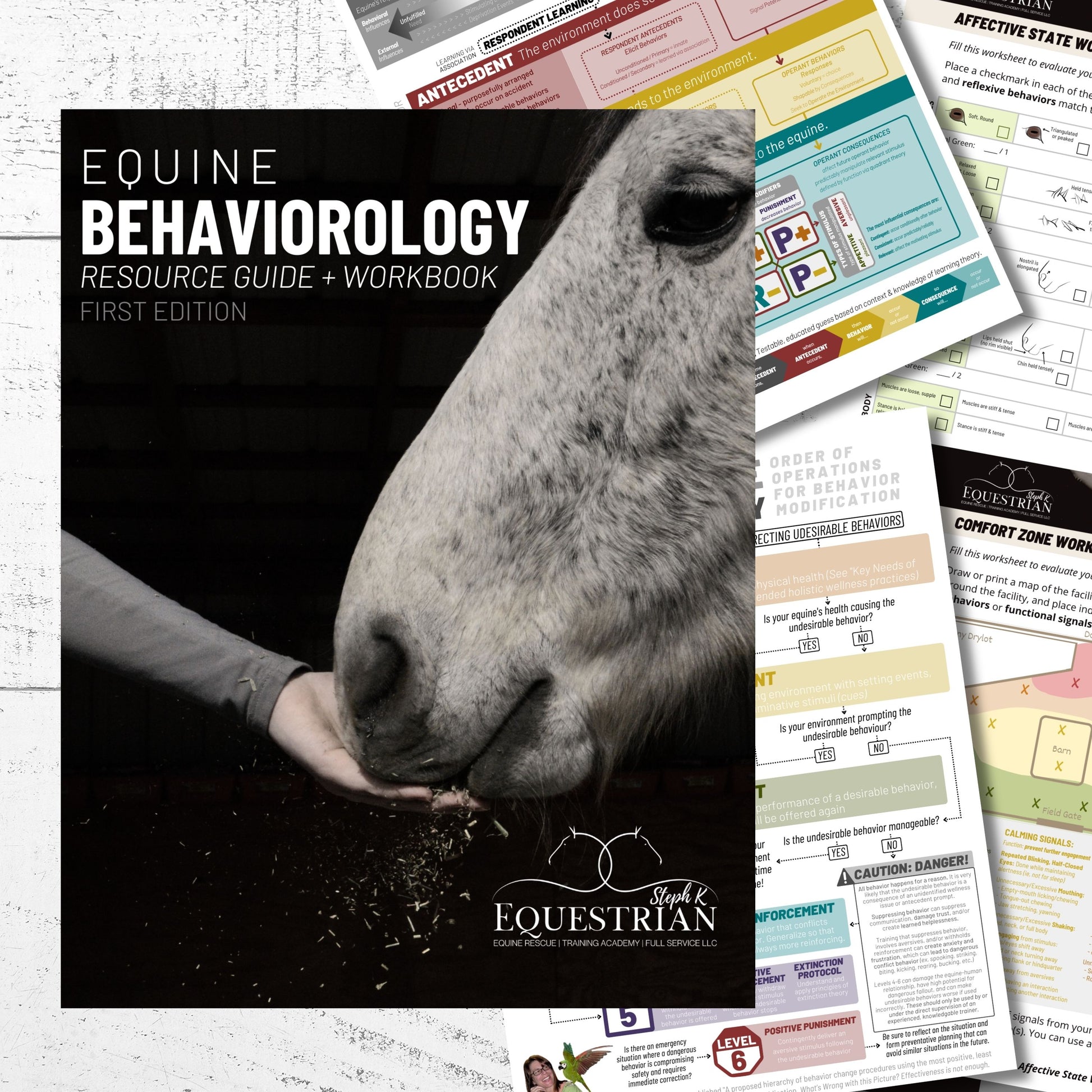
SKE Clicker Shoppe
PDF - Equine Behaviorology Resource Guide & Workbook
Share
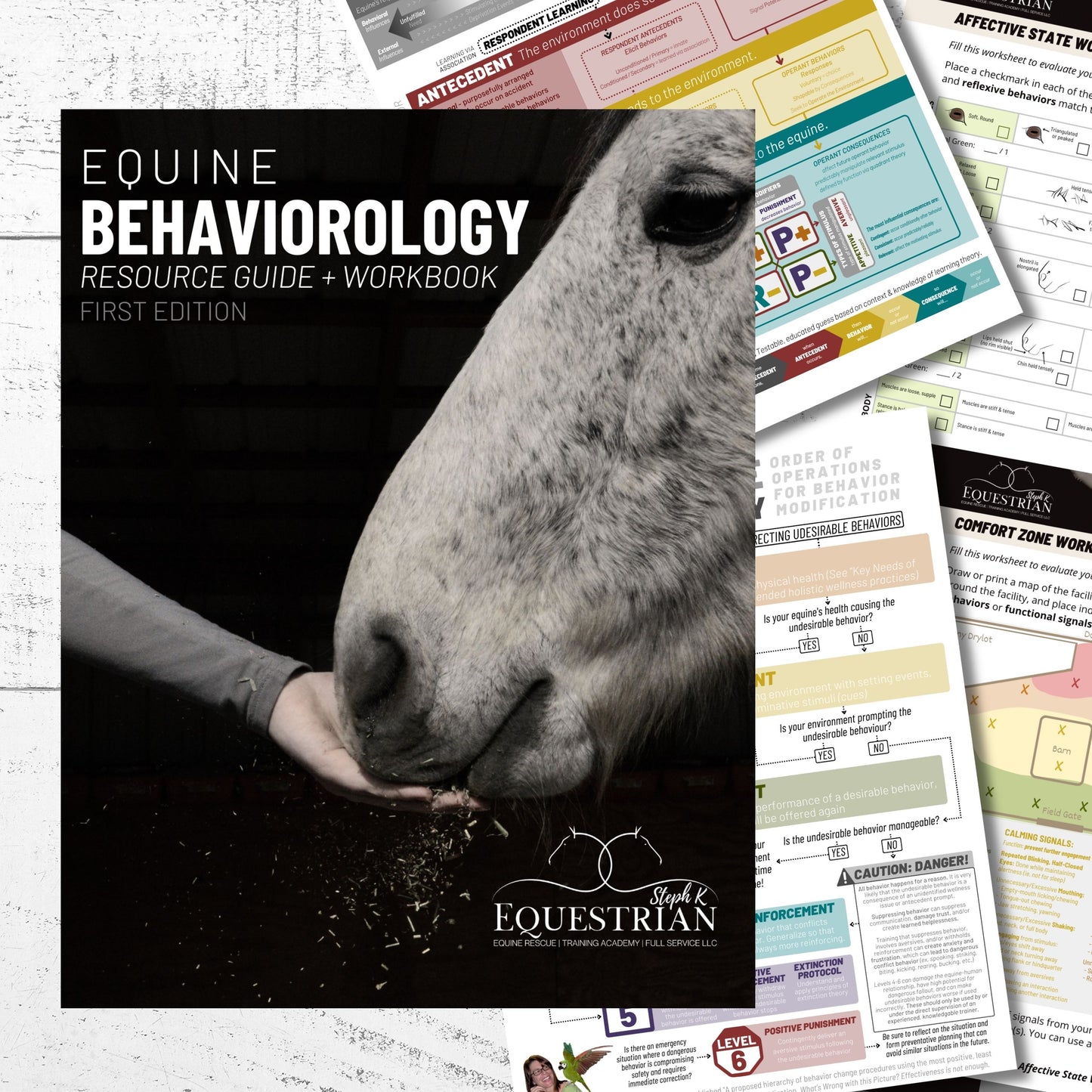
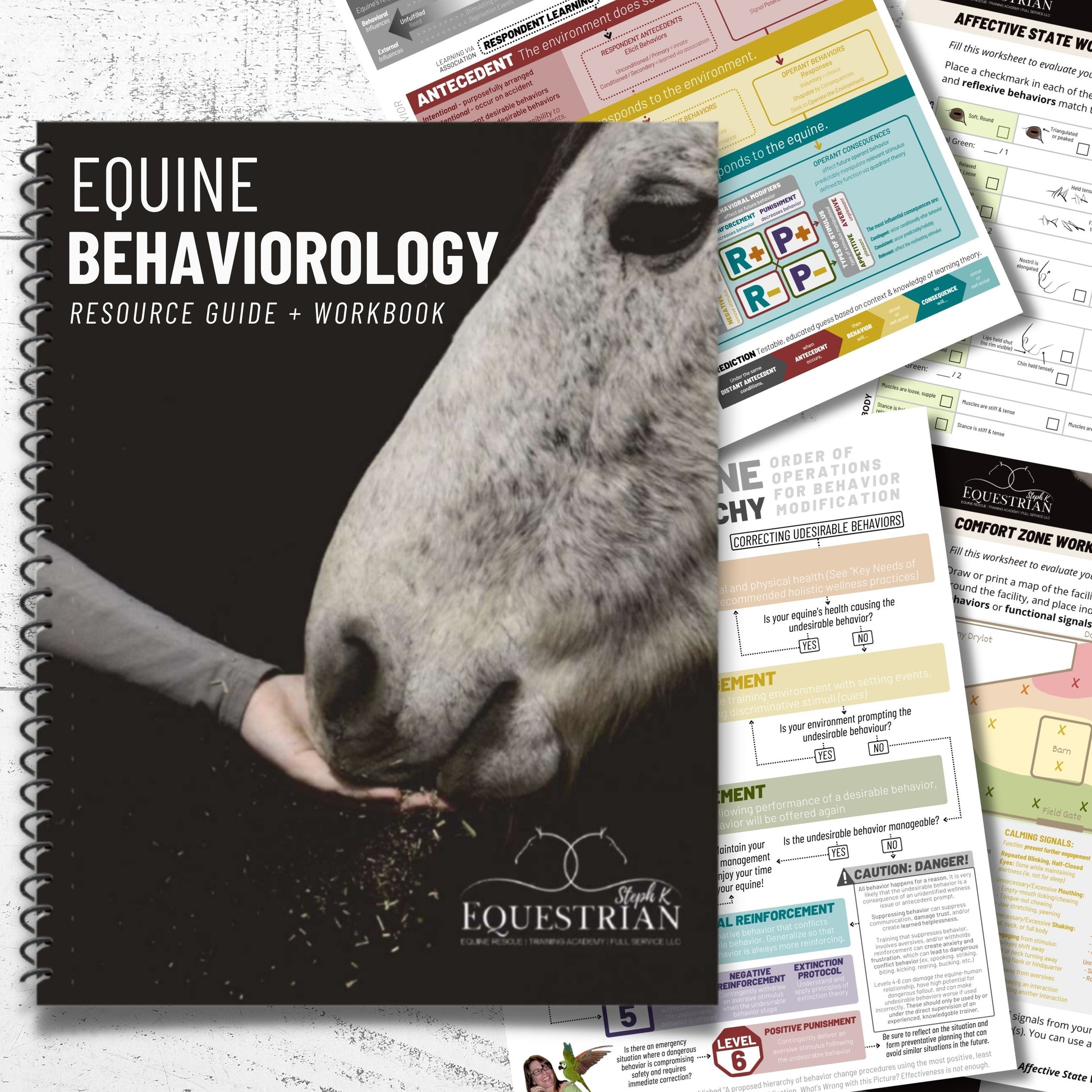
SKE Clicker Shoppe
Equine Behaviorology Resource Guide & Workbook
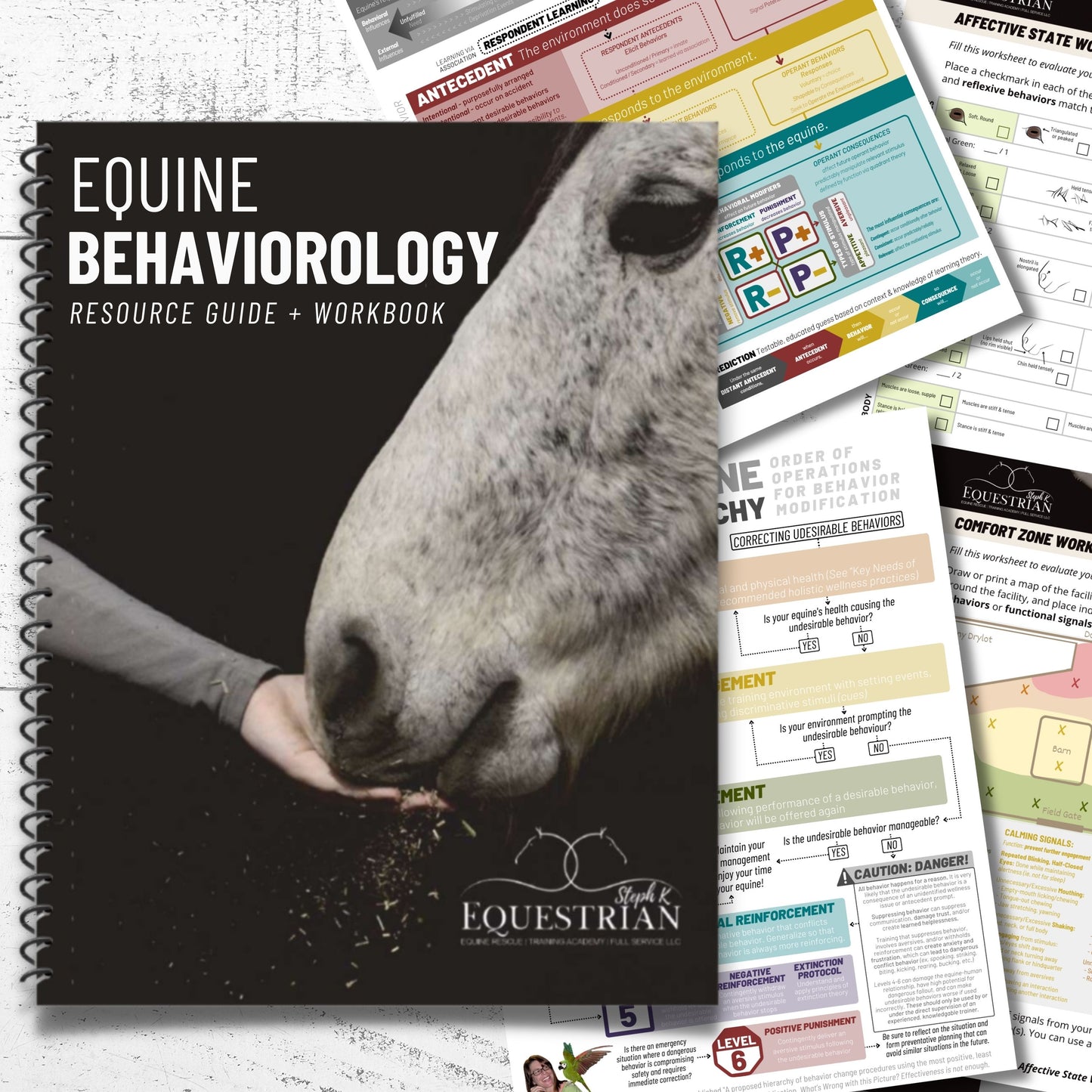
-
Your complete resource guide for all things Equine Behaviorology!
A spiral-bound resource guide & workbook, complete with course guide, syllabus, supplemental infographics & handouts, worksheets, & exercises. -
This resource guide & workbook covers EQUINE BEHAVIOROLOGY - the study of equine behavior. This book follows the "central dogma" of equine behaviorology: Ethology 👉 Learning Theory 👉 Ethical Considerations 👉 Experience
🐎 Equine Ethology allows us to understand motivation & predict typical behavior
🧠 Learning Theory allows us to understand how past experiences influence future behavior
❤️ Ethical Considerations allow us to evaluate & identify the best behavior solutions
🥕 Experience allows us to develop fluidity in the application of our knowledge -

Ethology Content
Constructive Behaviorism Resources
Motivation Resources & Worksheets
🌾 Defining Stimulus, Behavior, Motivation, & Saliency
🌾 Saliency as a dynamic & subjective stimulus
🌾 Ethological needs of equines
🌾 Motivating Operations
📝 Understanding Motivation Worksheet
📝 Filled Samples of the Understanding Motivation Worksheet
Understanding Equines Resources & Worksheets
🐴 Understanding Equine Body Language
🐴 Understanding Equine Stress Zones
🐴 Equine Calming Signals & Displacement Behavior
🐴 Equine Distance-Increasing Signals & Survival Reflexes
🐴 Equine emotions defined by Affective State and Energy Level
📝 Equine Affective State Worksheet
📝 Equine Comfort Zone Worksheet -

Learning Theory Content
🌟 Learning Theory Overview
Respondent Learning Theory Resources
🐴 Classical Conditioning
🐴 Stimulus Stacking
🐴 Relationship Theory & Models
Operant Learning Theory Resources
🥕 Quadrant Theory
🥕 Functional Analysis
Latent Learning Theory Resources
🐎 Observational Learning
🐎 Sensitization & Desensitization
🐎 Specialization & Generalization
🐎Stimulus Control, Cue Transfer, & Reinforcement Transfer
🎁 FREE Bonus Resources: Differential Reinforcement & Behavioral Extinction -

Ethical Considerations Content
Ethical Behavior Work Resources
❤️ Humane Hierarchy
❤️ EIEIO's (evaluating training methods)
❤️ LIMA (Least Intrusive Minimally Aversive)
❤️ Defining "Force-Free"
❤️ Trauma-Informed Equestrianism -

Practical Experience Content
Successful Applications Resources
🌟 Successive Approximation (Shaping)
🌟 Types of Interactions
🌟 Training Session Structure
🌟 Guiding & Accepting Approximations
🌟 Tips for Efficient & Effective R+ Training
🌟 SKE Jackpots Method
🌟 Understanding "Riding the Extinction Bursts" and "Following Discretionary Effort"
🌟 Dialogues During R+ Training
Foundation Behaviors Resources
🐎 Constructive Food Handling
🐎 Establishing Bridge Signals
🐎 Establishing a Calm Default Behavior (CDB)
🐎 Establishing a Calm Attentive Behavior (CAB)
🐎 Stimulus Control with CDB & CAB
🐎 Dialogue Fluidity via Dynamic Nose Targeting
🐎 Cooperative Care on a Self-Reinforcing Station
🐎 Free-Shaping Skills via Face Targeting -

Additional Clicker Exercises
This workbook includes over 25 additional exercises, plus several whole-arena setup ideas.
Individual PDF Supplementals
-
PDF - Constructive Behaviorism Handout
Regular price $1.99 USDRegular priceUnit price per -
PDF - Motivation Handout & Worksheet
Regular price $2.99 USDRegular priceUnit price per -
PDF - Understanding Equines, Body Language & Emotions
Regular price $2.99 USDRegular priceUnit price per -
PDF - Learning Theory Handouts Package
Regular price $6.99 USDRegular priceUnit price per$8.99 USDSale price $6.99 USDSale -
PDF - Respondent Learning Theory Handouts
Regular price $2.99 USDRegular priceUnit price per -
PDF - Operant Learning Theory Handouts
Regular price $2.99 USDRegular priceUnit price per -
PDF - Latent Learning Theory Handouts
Regular price $2.99 USDRegular priceUnit price per -
PDF - Ethical Behavior Work Handouts
Regular price $2.99 USDRegular priceUnit price per -
PDF - Successful Applications Handout Package
Regular price $6.99 USDRegular priceUnit price per$8.99 USDSale price $6.99 USDSale -
PDF - Shaping Handouts
Regular price $4.99 USDRegular priceUnit price per -
PDF - SKE Jackpots Method Handout
Regular price $1.99 USDRegular priceUnit price per -
PDF - Dialogues During R+ Handout
Regular price $1.99 USDRegular priceUnit price per -
PDF - Equestrian Safety Handouts
Regular price $1.99 USDRegular priceUnit price per -
PDF - Practical Foundation Behaviors Handouts
Regular price $6.99 USDRegular priceUnit price per

